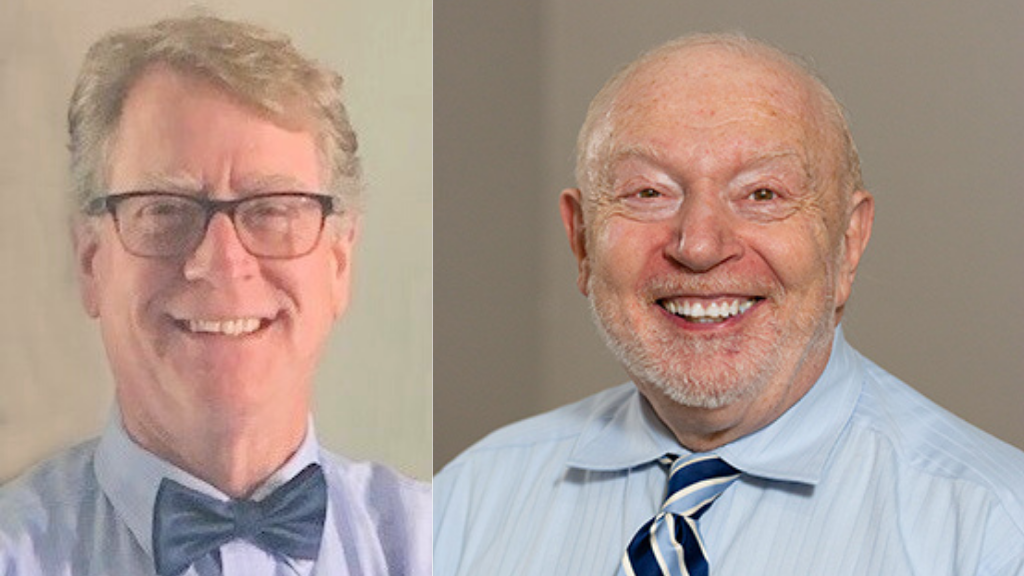Pictured Above: USF Faculty Senate President Tim Boaz (left) says USF’s budget planning process has had “a very damaging effect across the university,” while professor Steve Permuth voices concerns about what he calls the administration’s failures in communication.
Courtesy of USF
By Nancy McCann
For months, several members of the USF Faculty Senate have met almost every week with the administration to discuss the substantial budget deficit outlined by President Steve Currall.
But Faculty Senate President Tim Boaz says things aren’t adding up.
“The administration has continued to assert but hasn’t really demonstrated … they haven’t provided us the data … to document the presence of a structural budget deficit,” Boaz told the Faculty Senate Executive Committee on May 5.
“This is the one (deficit) that has been variously referred to as amounting to $56.9 million, or $43.1 million, and more recently $30.8 million,” he said.
The “structural deficit” is the biggest piece of what the Currall administration calls a “strategic realignment” of the university’s priorities and budget.
The administration began talking about strategic realignment last year, when the sobering financial implications of the COVID-19 pandemic became apparent.
As the administration began making COVID cuts – and planning for more – it announced that it also needed to find “permanent funding for investments made in previous years.”
According to the administration’s strategic realignment website, “the planned adjustments are $93.6 million over two years, with $36.7 million targeted for the fiscal year ending June 30, 2021, and $56.9 million for the year ending June 30, 2022 … to align recurring costs with recurring resources and achieve a balanced budget by June 30, 2022.”
“The $56.9 (million) represents USF’s efforts to align recurring expenses with recurrent revenues,” the website says. “Over the past several years, many recurring expenses were paid with nonrecurring … funds with the expectation of future state support” that has not materialized.
But Boaz, who as Faculty Senate president also sits on the USF Board of Trustees, says administrators now put the deficit at $30.8 million, not $56.9 million.
In fact, he says, his own research suggests that there may be little or no deficit at all.
“This whole process we’ve gone through in budget planning … has had a very damaging effect across the university,” Boaz said at the May 5 meeting. “People in many places of the university have been very stressed out over issues related to job security.”
The confusing budget picture – and the way the administration has handled it – has prompted fiery criticism from some faculty leaders, who contend the administrators’ hasty, secretive process has caused stress, fear and early retirements among faculty.
There have even been rumblings about a faculty vote of no confidence in the Currall administration.
Boaz confirmed that talk of a no-confidence vote has come up amid concerns about “communication failures” by the administration. But he said he is “not a big fan” of such votes.
“I am certain that there are people who are thinking about that (vote of no confidence) as an option,” he told The Crow’s Nest. “I would much prefer to engage the administration in conversation, try to come to some mutually agreeable solutions for the problems that we have, and work in that manner rather than making a dramatic, negative public statement.”
Some faculty leaders have already made dramatic, negative statements about the Currall administration.
The latest point of controversy is the university’s 769-acre forest preserve just north of the Tampa campus.
For years, USF faculty and students have used the preserve as a classroom for studying animal and plant life and the artifacts left there by indigenous people.
Many of them were stunned to learn that – without public discussion – the administration had posted a notice on April 1 asking potential developers to submit information about options to develop the land.
At the Faculty Senate Executive Committee on May 5, several members denounced the surprise move as the latest clumsy blunder by a tone-deaf administration.
“I’m getting concerned about communication,” said Steve Permuth, professor of educational leadership in the College of Education. “I’m getting concerned about a pattern where we seem to have things going on and the faculty in large have no idea what’s going on, nor the staff, nor the students.
“I’m hearing that we have this (forest preserve notice) out just for information … but I keep on wondering whether what we do is focused on return on investment, rather than excellence in programming for our students.”
David Lewis, an associate professor in the Department of Integrative Biology, said he’s “completely unassuaged” with the idea that “it’s only an RFI (request for information) or just gauging demand.”
“It’s now on the table to be developed,” Lewis said.
Even if a developer would go through “all of the hurdles” that would be required to develop environmentally sensitive land, “the land is still ruined,” he said.
When the Faculty Senate meets today, members are expected to discuss the preserve and the budget.



